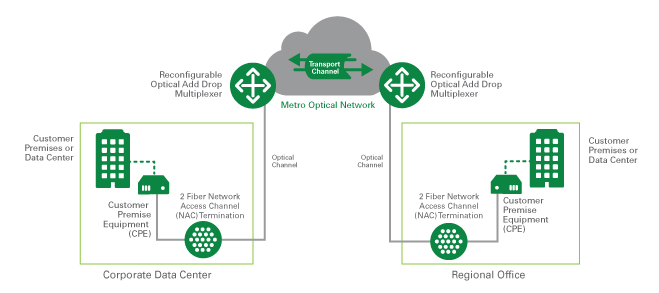Metro Ethernet Service is a flexible, easy-to-use, fiber transport service that uses Ethernet transport technology. Metro E allows customers to connect multiple enterprise locations using native Ethernet protocol. Metro Ethernet supports transmission speeds as low as 10 Mbps and up to 10 Gbps in increments of 10 Mbps from 10 to 100 Mbps, 100 Mbps from 100 to 1,000 Mbps and 1 Gbps from 1 Gbps to 10 Gbps.

Metro Ethernet is a layer 2 technology that can be connected directly into a network switch however it can also be connected to a router if desired. The service consists of an Access Link and an Ethernet port. The Access Link connects a customer facility at the NI (carrier network interface) to an Ethernet port on the carrier Metro Ethernet network with a standard optical or copper connection. Most of the time Metro E is fiber however where available speeds up to 10mb can be provided by EoC (Ethernet over copper).
Quality of Service
Quality of Service for Metro Ethernet (QoS) will allow customers to prioritize their traffic in four classes of service. The four different levels are Priority 1, Priority 2, Priority 3 and Priority 4. Together, they allow you to match the correct level to your applications such as voice, video, etc. In addition to the Priority 1 traffic, Priorities 2, 3 and 4 traffic percentage levels are specified for the remainder of the Bandwidth Profile. Most carriers offer various templates for QoS that you can choose from.
Pricing
Pricing depends on location and loop cost so its hard to just throw out a list of speeds and prices without plugging in particular addresses however in most locations 10mb can be found around $600 per month. Metro Ethernet scales pretty inexpensively and scales up to 100mb for about $1000. However in the right locations I’ve seen 100mb as cheaply as $300 per month so it really depends on how much the loop cost is at your particular location.






